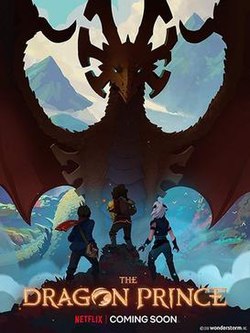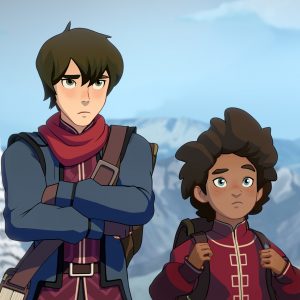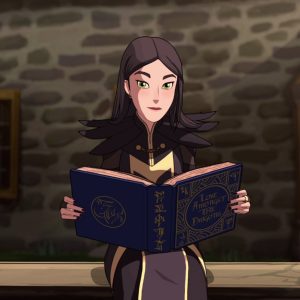 Rom-coms have a clear formula: the potential love interests meet early on in the story, the potential love interests face obstacles in getting together, the love interests then finally get together (potentially facing more obstacles before they are for real together together). Simple.
Rom-coms have a clear formula: the potential love interests meet early on in the story, the potential love interests face obstacles in getting together, the love interests then finally get together (potentially facing more obstacles before they are for real together together). Simple.
Why the rehash of a well-known genre, you ask? Because reviewers and whoever does the posters and promos at Netflix seem to think the limited series From Scratch is a rom-com. Some critics compared it to typical (if “elevated”) fare from Hallmark and Lifetime during the holiday season, and Netflix itself recommends viewers of the limited series to check out Love & Gelato (very much a rom-com) and Emily in Paris, which… I guess they’re related, if you want to watch something where an American goes to live in Europe for awhile?
It’s a frustrating diminishment of a moving drama based on Tembi Locke’s memoir of the same name. Created and partially written by Locke and her sister, Attica, the series follows Zoë Saldaña’s Amy, who meets future husband, Lino (played by Eugenio Mastrandrea) while studying abroad in Florence. The closest the series gets to the rom-com formula is its first episode, but even here one can see the deeper dramatic themes the series exemplifies: beginnings (and endings), beginning after an ending, and the emotions that so often characterize beginnings and endings—grief, love, hope, and regret. The stakes are also much more real than in a rom-com, with their often disposable significant others who are clearly not meant for one of the story’s potential love interests. This difference is made very clear in the first episode when Lino confronts Amy about doing something that has clearly hurt him to the core. Amy, who has mostly been treating her relationship with Lino (and others) like a short-term, just for fun, compartmentalized study-abroad experience, is forced to realize what she’s doing matters to him, and her.
The first episode also sets up another major factor the series will deal with, which are the realities romance must deal with in the real world: towards the end of her time in Florence, Amy is visited by her father (played by the inimitably voiced Keith David) and step-mother. Amy’s father is keen to get her back in law school and away from this art business she’s been studying in Florence. Her step-mother, played with a lovely warmth by Judith Scott, is equally keen to keep the peace.
It’s an experience many can relate to from their teens and twenties (or maybe even later), where conflicts flourish between the generations as the grown-up child begins to conform less and less with what their parents thought they were going to be. But what makes the series particularly lovely is how many years it traces (well over a decade): we see Amy’s relationships with her father, step-mother, and mother all develop, shift, and grow as she and Lino eventually marry, then adopt a child of their own some years later. And we get to see this happen with Lino’s family as well. Cultural misunderstandings abound, but are also worked through in ways that are not quick, easy, or melodramatic—the result feels much more real than the vast majority of dramas out there.
This is all assisted by there being no weak characters in the supporting cast of family and friends, as well as how excellent Saldaña and Mastrandrea are as the series’ leads. Even so, the standout in the familial relationships is Amy’s sister, Zora, played by Danielle Deadwyler. As Amy’s older sister, she clearly carried some of the weight for Amy as they both navigated their parents’ divorce, who separated while they were children. Rather than being a one-note supporting role, we see Zora as a fully rounded person. She is sometimes frustrated and annoyed with both Amy and Lino (particularly when they are forced to live with her for an extended period), but when it comes down to it, she is always there for them, no matter what heartbreak may come their way. Seeing such a fierce, loving, and caring person played with such depth is far too rare in storytelling, and Deadwyler’s sheer power and presence in the role makes it clear how important having such a person in your life can be.
It’s rare for stories to take the time to grapple with life so wholly as From Scratch does, and it being a limited series means it won’t be back for more, trying to scrounge up additional drama or character failings like some series have to do when they’re extended. It told the story it wanted to tell, and it actually left me emotionally rocked and in tears more than once—no mean feat, and certainly not something a rom-com is generally able to do (no matter how much I enjoy that genre). From Scratch is a family drama about love, life, and death, and it is not to be missed.

 It’s actually become a critical trope in and of itself to say there are no new stories (in other words, every tale is simply made up of well-known narrative techniques). I’ve never been a fan of such over-generalizing, but it is worth noting how a newly created movie or book makes use of all the stories that have come before it. Some can approach things in such a fresh way that they seem completely unlike anything before, much like The Lord of the Rings and Star Wars: A New Hope did when they first arrived. And others can seem hopelessly imitative, like
It’s actually become a critical trope in and of itself to say there are no new stories (in other words, every tale is simply made up of well-known narrative techniques). I’ve never been a fan of such over-generalizing, but it is worth noting how a newly created movie or book makes use of all the stories that have come before it. Some can approach things in such a fresh way that they seem completely unlike anything before, much like The Lord of the Rings and Star Wars: A New Hope did when they first arrived. And others can seem hopelessly imitative, like  What makes The Dragon Prince such a standout for everyone to watch (it is NOT just a children’s animated series, no matter how much the
What makes The Dragon Prince such a standout for everyone to watch (it is NOT just a children’s animated series, no matter how much the  Probably the most powerful statement the show creates from its familiar elements is about choice: why are you doing what you are doing, and to what end? Not thinking about the true end of their choices is a consistent problem for its characters, and sets up the crux of the storyline for the show’s three seasons. At its beginning, a group of elvish assassins have been sent to kill a human king and his heir, the human king having himself killed the King of the Dragons previously (out of revenge for the death of someone else). As the viewer learns more, they begin to see that this is just the most recent in a long history of humans and magical creatures pursuing vengeance or power (the one sometimes mistaken for or blended with the other).
Probably the most powerful statement the show creates from its familiar elements is about choice: why are you doing what you are doing, and to what end? Not thinking about the true end of their choices is a consistent problem for its characters, and sets up the crux of the storyline for the show’s three seasons. At its beginning, a group of elvish assassins have been sent to kill a human king and his heir, the human king having himself killed the King of the Dragons previously (out of revenge for the death of someone else). As the viewer learns more, they begin to see that this is just the most recent in a long history of humans and magical creatures pursuing vengeance or power (the one sometimes mistaken for or blended with the other).